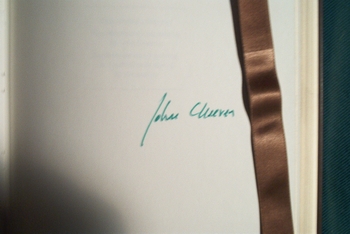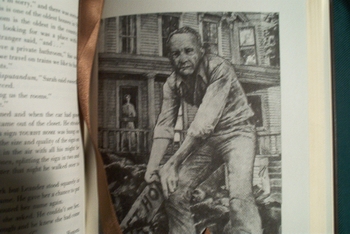Franklin Library John Cheever books
The Wapshot Chronicle - signed limited edition -1978The Stories of - limited first edition ( not signed ) - 1980
The Stories of - Pulitzer prize classics - 1985
John Cheever biography
John Cheever, born on May 27, 1912, in Quincy, Massachusetts, was an American novelist and short story writer whose works are celebrated for their exploration of suburban life, complex characters, and keen observations of human behavior. Cheever became a prominent figure in American literature during the mid-20th century, and his writing is often associated with the portrayal of the American middle class. Cheever's early life was marked by struggles, including his family's financial difficulties and his father's battle with alcoholism. These early experiences would later influence much of Cheever's fiction. After attending Thayer Academy, he worked various jobs before enrolling at Boston University. His journey as a writer began with the publication of his short stories in magazines like The New Yorker.
His first collection of short stories, The Way Some People Live (1943), garnered attention, setting the stage for his literary career. Throughout the 1940s and 1950s, Cheever continued to publish short stories in prestigious magazines, establishing himself as a master of the form. His stories often explored the tension and disquiet beneath the seemingly tranquil surface of suburban life. In 1957, Cheever achieved widespread acclaim with the publication of his novel The Wapshot Chronicle, which won the National Book Award for Fiction. This was followed by The Wapshot Scandal (1964), creating a notable literary presence for Cheever. However, it was his short stories that solidified his reputation as a master of the form. His collection The Stories of John Cheever (1978) won the Pulitzer Prize for Fiction and the National Book Critics Circle Award. Cheever's works often grappled with themes of conformity, identity, and the impact of societal expectations on individual lives. His writing displayed a deep understanding of human nature, coupled with a sharp wit and an acute sense of irony. His exploration of suburban life and the complexities of family dynamics resonated with readers and critics alike.
The Swimmer
The Swimmer is one of John Cheever's most famous short stories, first published in The New Yorker in 1964. The story is a poignant exploration of suburban life and the disintegration of the American Dream. Neddy Merrill, the protagonist, embarks on a surreal journey through the swimming pools of his affluent suburban neighborhood, hoping to swim across the county through a chain of pools. Neddy's odyssey begins with a sense of optimism and enthusiasm, representing the carefree and leisurely lifestyle of suburban affluence. However, as he progresses from one pool to the next, the tone of the story shifts. The seasons change, and Neddy's physical and emotional state deteriorates. The story becomes a metaphorical representation of the passage of time and the inevitable hardships that life brings. As Neddy traverses the pools, he encounters various acquaintances, each interaction revealing the changing social dynamics and his own declining status. The once-vibrant and social Neddy is met with confusion, pity, and even rejection. The pools, initially a symbol of luxury and success, gradually become a metaphor for the emptiness and disillusionment that underlie suburban life. The climax of The Swimmer occurs when Neddy reaches his home, only to find it abandoned and decrepit. The reader realizes that his perception of time and reality is distorted, and he has lost not only his wealth and social standing but also his family. The story is a powerful exploration of denial, the consequences of living in a bubble of privilege, and the inevitable hardships of life that one cannot escape. The Swimmer by John Cheever is celebrated for its allegorical depth, its critique of suburban life, and its portrayal of the fragility of the American Dream. The story's symbolism, combined with Cheever's masterful prose, makes it a classic in American literature, offering readers a thought-provoking reflection on the human condition and the pursuit of happiness.
Reunion
Reunion is a short story written by John Cheever, first published in 1962. The narrative revolves around the strained relationship between a father and son, Charlie and his teenage son, Charlie Jr., set against the backdrop of a brief encounter in New York City. The story begins with Charlie, a businessman, arriving at Grand Central Terminal to catch a train. Unexpectedly, he decides to use a layover to meet his son, whom he hasn't seen in three years. The relationship between the two characters is immediately marked by tension and distance, hinted at by the fact that Charlie Sr. is no longer married to the boy's mother. As they meet for a short reunion, it becomes apparent that Charlie Sr. is a complex character. He orders drinks for his son, attempting to bond over cocktails, but his behavior is increasingly erratic and inappropriate. The father's flaws and the strained nature of their relationship come to the forefront as the story unfolds. The encounter takes a turn for the worse when Charlie Sr. creates a scene at a restaurant and ultimately abandons his son without explanation. The story concludes with Charlie Jr. left alone, contemplating the complexities of his relationship with his father. Reunion by John Cheever is a poignant exploration of familial dysfunction, communication breakdowns, and the impact of personal flaws on relationships. Cheever's narrative skill shines through as he captures the nuances of human behavior and the emotional weight carried by unresolved family issues. The brevity of the story adds to its impact, leaving readers with a powerful and lasting impression of the complexities inherent in family dynamics.
Despite his literary success, Cheever faced personal challenges, including struggles with alcoholism and issues within his own family. His struggles with these demons often found their way into his writing, adding a layer of authenticity and depth to his work. John Cheever passed away on June 18, 1982, leaving behind a rich literary legacy. His contributions to American literature, particularly in the realm of short fiction, continue to be celebrated. Cheever's keen insights into the human condition and his ability to capture the nuances of everyday life have ensured his enduring influence on subsequent generations of writers and readers.
The Wapshot Chronicle
The Stories of John Cheever
Here
are sixty-one stories that chronicle the lives of what has been called
"the greatest generation." From the early wonder and disillusionment of
city life in "The Enormous Radio" to the surprising discoveries and
common mysteries of suburbia in "The Housebreaker of Shady Hill" and
"The Swimmer," John Cheever tells us everything we need to know about
"the pain and sweetness of life."
Goodbye, my brother
The common day
The enormous radio
O city of broken dreams
The Hartleys
The Sutton Place story
The summer farmer
Torch song
The pot of gold
Clancy in the Tower of Babel
Christmas is a sad season for the poor
The season of divorce
The chaste Clarissa
The cure
The superintendent
The children
The sorrows of gin
O youth and beauty!
The day the pig fell into the well
The five-forty-eight
Just one more time
The housebreaker of Shady Hill
The bus to St. James's
The worm in the apple
The trouble of Marcie Flint
The bella lingua
The Wrysons
The country husband
The duchess
The scarlet moving van
Just tell me who it was
Brimmer
The golden age
The lowboy
The music teacher
A woman without a country
The death of Justina
Clementina
Boy in Rome
A miscellany of characters that will not appear
The chimera
The seaside houses
The angel of the bridge
The brigadier and the golf widow
A vision of the world
Reunion
An educated American woman
Metamorphoses
Mene, mene, tekel, upharsin
Montraldo
The ocean
Marito in città
The geometry of love
The swimmer
The world of apples
Another story
Percy
The fourth alarm
Artemis, the honest well digger
Three stories
The jewels of the Cabots





No comments:
Post a Comment
Share your best book review and recommendation